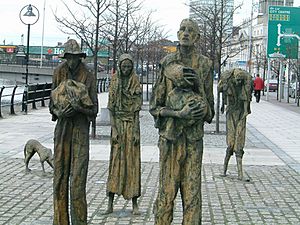National Famine Commemoration Day facts for kids
The National Famine Commemoration Day (Irish: Lá Cuimhneacháin Náisiúnta an Ghorta Mhóir) is a special day in Ireland. It remembers the Great Famine, a time of great hunger and hardship that happened many years ago. Each year, a series of events takes place for a week, leading up to the main commemoration day, usually a Sunday in May. The government of Ireland has officially organized this day since 2008. The main event moves to a different part of Ireland each year. There is also an international event held in a place important to Irish people living abroad.
Events on this day include talks, art shows, and visits to places connected to the Famine. The government encourages local communities to hold their own events. They also suggest a minute's silence on the day, or on the Friday before for schools and workplaces.
Contents
Remembering the Great Famine
How the Commemoration Began
The Great Famine was a very difficult time in Ireland, lasting from 1845 to about 1850. Many people suffered from hunger and lost their lives. In 1994, the Irish government created a special committee. This group helped fund events and projects to remember the 150th anniversary of the Famine. Their work continued until the year 2000.
Even before the official day, people found ways to remember the Famine. Since 1987, a yearly "Famine Walk" has taken place in County Mayo. This walk goes from Louisburgh to Doolough. It remembers a sad event from March 1849, known as the Doolough Tragedy.
From 2004, a group called the Committee for the Commemoration of the Irish Famine Victims (CCIFV) started its own yearly event in Dublin. Every May, people dressed as hungry peasants walked from the Garden of Remembrance to the Famine memorial sculptures. This group worked hard to get the government to officially recognize a Famine commemoration day.
Official Recognition and Growth
Many politicians supported the idea of an official day. The leader of the government at the time, Taoiseach Bertie Ahern, discussed the idea several times. At first, he thought one memorial for all big historical events might be better. But by 2007, he was more open to a special memorial day for the Famine.
In 2007, the CCIFV walk received some official attention. Government ministers hosted receptions for the event. Then, in 2008, the government announced that it would officially organize an annual Famine commemoration. The first official National Famine Commemoration Day was held in July 2008.
Guiding the Commemoration
In July 2008, Éamon Ó Cuív, a government minister, set up the National Famine Commemoration Committee. This committee's main job was to plan how future national commemorations would happen. They also wanted to explore important themes. These themes included the legacy of Irish people moving to other countries, the loss of culture, and the decline of the Irish language. They also focused on issues like food security and Ireland's strong commitment to humanitarian aid.
This committee has since recommended the locations for the main commemoration events. The event rotates among Ireland's four provinces. For example, in 2015, the event was held in Newry, County Armagh, which is in Northern Ireland.
Some politicians also worked to make the date of the commemoration fixed. In 2016 and 2017, members of parliament suggested bills to set the day as the second Sunday of every May. This was to avoid uncertainty about the date each year.
See also
- National Day of Commemoration
 | William M. Jackson |
 | Juan E. Gilbert |
 | Neil deGrasse Tyson |


